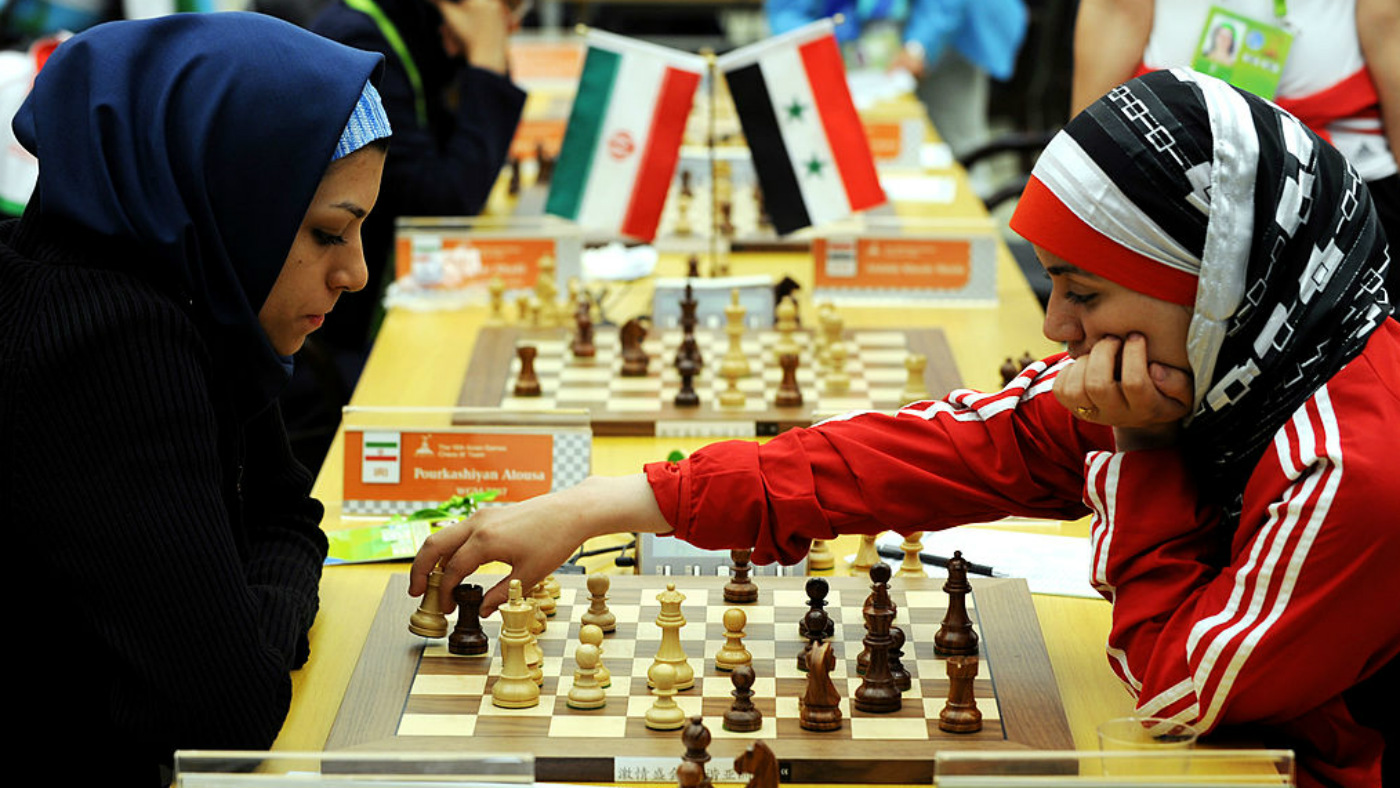Female chess grandmasters rebel over hijabs for Iran competition
Players threaten to boycott world championships if they are forced to abide by country's strict gender laws

A free daily email with the biggest news stories of the day – and the best features from TheWeek.com
You are now subscribed
Your newsletter sign-up was successful
Female chess grandmasters have condemned the decision to hold the next world championships in Iran and accused governing body Fide of violating its own rules against gender discrimination.
It was announced that the prestigious event will be held in Tehran next year, but the choice of location has met with uproar from players.
It was a "ridiculous" choice, said British grandmaster Jovanka Houska.
The Week
Escape your echo chamber. Get the facts behind the news, plus analysis from multiple perspectives.

Sign up for The Week's Free Newsletters
From our morning news briefing to a weekly Good News Newsletter, get the best of The Week delivered directly to your inbox.
From our morning news briefing to a weekly Good News Newsletter, get the best of The Week delivered directly to your inbox.
Giving the championships to Iran, where a strict Islamic code of modesty has been imposed on women since the 1979 revolution, demonstrated a "lack of concern" for female players, who had been made to feel "uncomfortable" at previous, smaller competitions held in the country, she added.
Several players have threatened to withdraw from the contest if they are forced to wear hijabs, in line with the country's modesty laws.
The backlash over the Islamic nation's dress code is part of a wider concern about how the country's rules could impact on female players' performances. For instance, strict gender segregation would prevent them from being alone with their male coaches.
Current US champion Nazi Paikidze told The Times: "This is a country where to this day women's rights are severely restricted. I will not be supporting this oppression of women by wearing a hijab myself."
A free daily email with the biggest news stories of the day – and the best features from TheWeek.com
Paikidze said she now faced an untenable situation, knowing she risked imprisonment if she attended the championships without a headscarf.
Women who neglect to cover their hair and wear modest clothing in public can receive a fine, prison sentence or lashes.
Under the presidency of reformist Mohammad Khatami in the late 1990s and early 2000s, some Iranian women began to push the boundaries by wearing skimpier hijabs and tighter-fitting, Western-style clothing.
However, there is evidence of a recent conservative backlash, the Middle East Institute reports, with a string of acid attacks in 2014 believed to be retaliations against women perceived to be wearing an insufficiently modest head covering.
In response, Fide's Commission for Women's Chess urged participants to respect "cultural differences" and abide by Iranian law.
-
 5 cinematic cartoons about Bezos betting big on 'Melania'
5 cinematic cartoons about Bezos betting big on 'Melania'Cartoons Artists take on a girlboss, a fetching newspaper, and more
-
 The fall of the generals: China’s military purge
The fall of the generals: China’s military purgeIn the Spotlight Xi Jinping’s extraordinary removal of senior general proves that no-one is safe from anti-corruption drive that has investigated millions
-
 Why the Gorton and Denton by-election is a ‘Frankenstein’s monster’
Why the Gorton and Denton by-election is a ‘Frankenstein’s monster’Talking Point Reform and the Greens have the Labour seat in their sights, but the constituency’s complex demographics make messaging tricky
-
 Epstein files topple law CEO, roil UK government
Epstein files topple law CEO, roil UK governmentSpeed Read Peter Mandelson, Britain’s former ambassador to the US, is caught up in the scandal
-
 Iran and US prepare to meet after skirmishes
Iran and US prepare to meet after skirmishesSpeed Read The incident comes amid heightened tensions in the Middle East
-
 Israel retrieves final hostage’s body from Gaza
Israel retrieves final hostage’s body from GazaSpeed Read The 24-year-old police officer was killed during the initial Hamas attack
-
 China’s Xi targets top general in growing purge
China’s Xi targets top general in growing purgeSpeed Read Zhang Youxia is being investigated over ‘grave violations’ of the law
-
 Panama and Canada are negotiating over a crucial copper mine
Panama and Canada are negotiating over a crucial copper mineIn the Spotlight Panama is set to make a final decision on the mine this summer
-
 Why Greenland’s natural resources are nearly impossible to mine
Why Greenland’s natural resources are nearly impossible to mineThe Explainer The country’s natural landscape makes the task extremely difficult
-
 Iran cuts internet as protests escalate
Iran cuts internet as protests escalateSpeed Reada Government buildings across the country have been set on fire
-
 US nabs ‘shadow’ tanker claimed by Russia
US nabs ‘shadow’ tanker claimed by RussiaSpeed Read The ship was one of two vessels seized by the US military